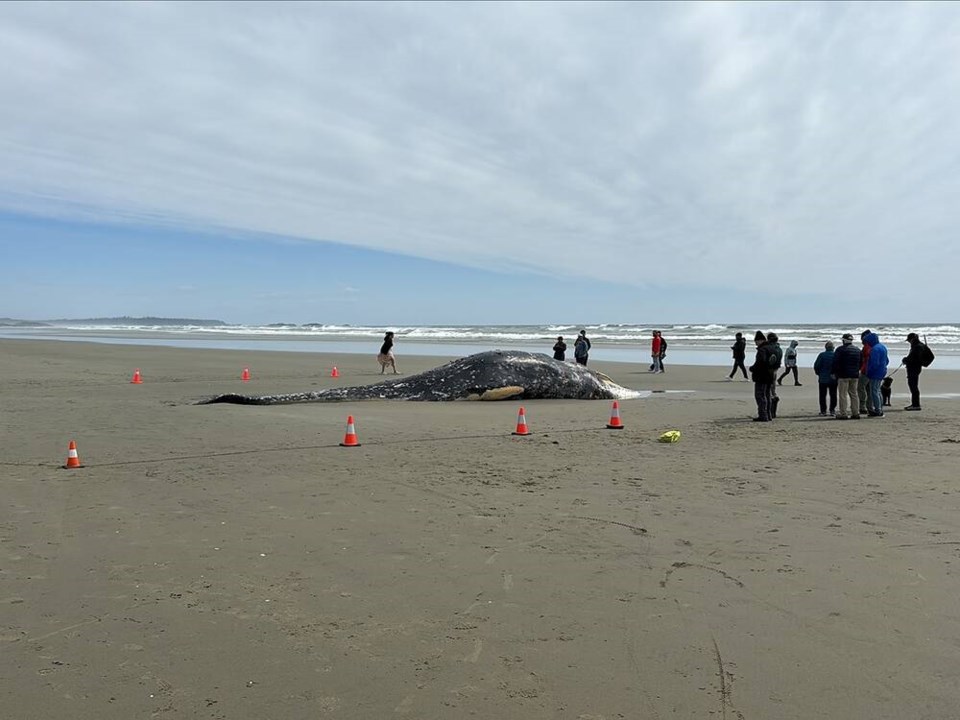A dead grey whale washed up on Long Beach near Tofino this week is the first discovered fatality of the season in British Columbia waters — and could be part of a troubling trend of spring stranding events along the North American coast as the cetaceans migrate to their northern feeding grounds.
Washington state-based Cascadia Research Collective, which specializes in marine mammals, said grey whale strandings, which occur during the spring migration months, started this year on April 2 when an adult female was found dead on the Long Beach Peninsula.
The collective said since then six more dead grey whales have been documented in Washington State.
According to a report in the Los Angeles Times on April 8, at least 70 whales have perished since the start of the year in the lagoons of Mexico’s Baja California peninsula where the greys gather to calf, nurse and breed.
Three other grey whales have died in San Francisco Bay recently during their migration north, with one showing signs of malnourishment.
“The number of strandings this year is higher than we typically see at this point in the stranding season, sparking concerns about the recovery of the gray whale population after the unusual stranding event that occurred from 2019-2023,” Cascadia Research Collective said on its website.
Over that period, the U.S. federal ocean agency, NOAA, reported 690 grey whale strandings, including 347 in the United States, 316 in Mexico and 27 in British Columbia. An investigation concluded that the preliminary cause of the deaths was localized ecosystem changes in the whale’s subarctic and arctic feeding areas that led to changes in food, malnutrition, decreased birth rates and increased mortality.
The Cascadia Research Collective said whales found in Washington this year have primarily been adults with evidence of malnutrition — loss of oil in the blubber layer, lack of internal fat stores and no food in the stomach or intestines.
Fisheries and Oceans Canada said Thursday the dead whale on Long Beach was discovered floating offshore Tuesday and came ashore on Wednesday. The agency’s Marine Mammal Response Team has been working with Parks Canada and the Tla-o-qui-aht First Nation to co-ordinate a plan to secure the animal and perform a necropsy.
The DFO did not comment on the condition of the carcass and said it will not be able to confirm cause of death until after the necropsy and final reports are complete, which usually takes two to three months. Necropsies are done by the province.
Parks Canada, Tla-o-qui-aht First Nation, and Fisheries and Oceans Canada are securing and protecting the animal and asking people to keep their distance.
Parks Canada said Tla-o-qui-aht Tribal Park Guardians said access is restricted for health and safety reasons, and in respect for the whale. Visitors are only allowed to observe the carcass from a distance, and touching the whale is prohibited.
Neither Parks Canada nor the DFO responded to questions about what will happen to the carcass after the necropsy is completed. Whales are sometimes towed to secluded and protected areas to decompose and their bones used for research or displays.
The DFO said grey whales in Canada live only in the North Pacific. In 2017, the Committee on the Status of Endangered Wildlife in Canada assessed the grey whale as having three distinct populations, two of which as endangered.
At this time, DFO said it is not able to confirm to which of the three grey whale populations the dead whale belonged.
The Island-based Marine Education and Research Society, which advocates for whales and boater safety, said grey whales are at high risk of vessel strikes. “They often travel and feed very close to shore in the sand and often surface more or less in the same position again and again,” the society said. “If emaciated, they may be even more difficult to see … less fat, less buoyant in the water … and in even more risk of vessel strike.”
The DFO is reminding the public to use the Observe, Record, Report/ Marine Mammal Incident Hotline at 1-800-465-4336 if they see a whale being harassed or disturbed.
Reports can also be made if anyone sees whales involved in collisions or entanglements.
Mariners who are unable to reach the incident reporting hotline can call the Canadian Coast Guard’s Marine Mammal Desk at 1-833-339-1020 or report it to CCG marine traffic radio.



